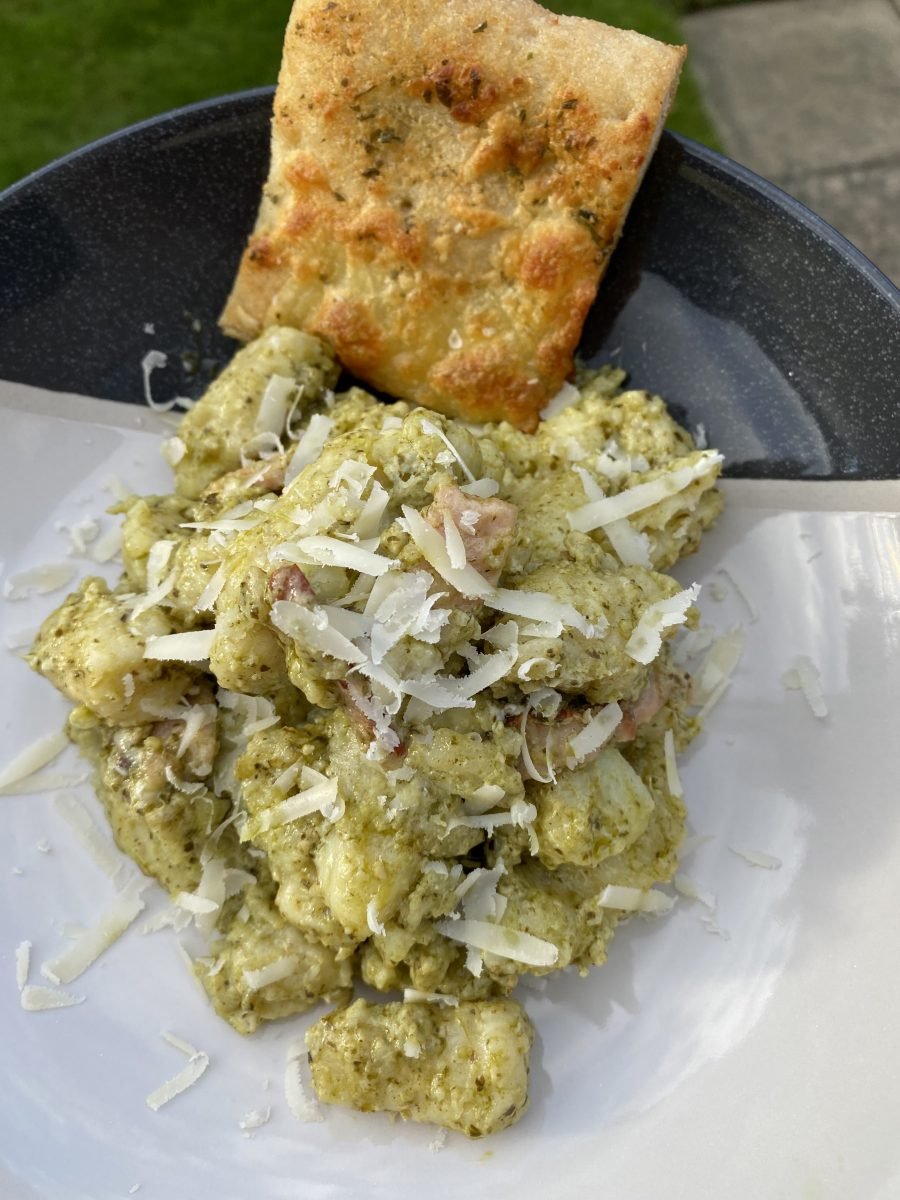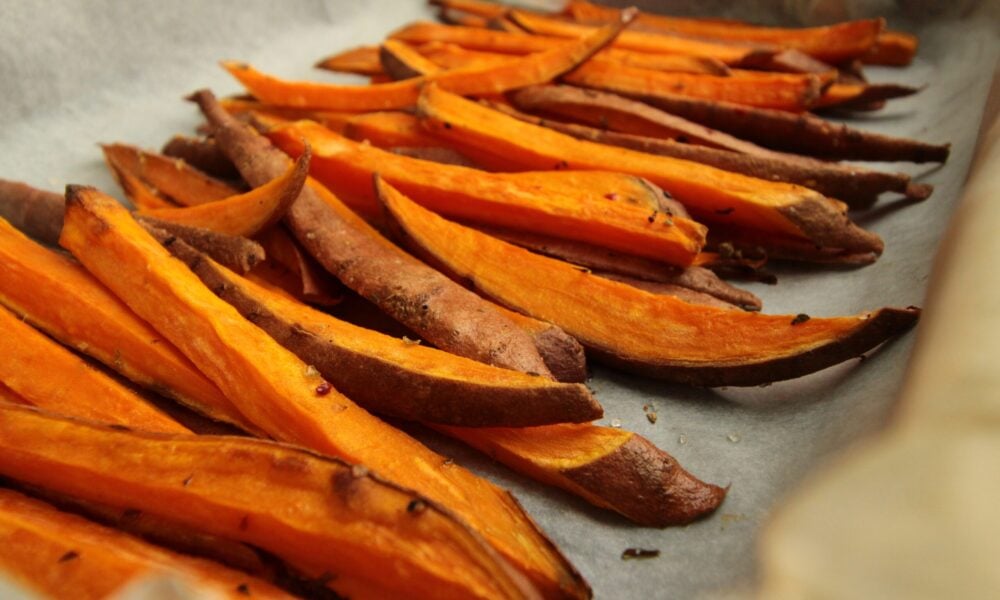Sweet potatoes or white potatoes? Which one is better for you in terms of nutrients, carbs, calories, and vitamins. Keep reading to find out and to discover the healthiest ways to cook with them.
The battle between Sweet Potatoes vs Potatoes
Both potatoes and sweet potatoes belong to the root vegetable family but are only distantly related. White potatoes are part of the nightshade family, whereas sweet potatoes belong to the morning glory family. They contain different nutrients and have varied effects on blood sugar levels.
In this blog post, we’ll explore the differences between sweet potatoes and white potatoes in terms of nutritional value, taste, fat content, and versatile, healthy ways to cook with each.
Both types of potato are extremely popular worldwide and are staples in many cuisines, prepared in numerous ways. They rank among the most produced crops globally.
Potatoes are easy to prepare, delicious, and filling, making them a versatile addition to any meal, whether breakfast, lunch, or dinner. They are highly nutritious and can be a valuable part of a balanced, healthy diet. While sweet potatoes are often seen as more nutrient-dense, both types offer substantial health benefits.
Nutritional value of potatoes vs sweet potatoes
Potatoes contribute a lot to a healthy diet, offering nutrients and fibre while being low in calories. Many Brits ask Google, “Which is healthier: potatoes or sweet potatoes?” Although both are healthy, sweet potatoes may have a slight edge due to their beta carotene and vitamin A content. Sweet potatoes also count towards our 5-a-day, whereas white potatoes do not, because of their naturally high starch content.
Beta carotene is an antioxidant that helps protect body cells from damage, potentially reducing the risk of certain cancers. This is one reason sweet potatoes are often considered the more nutritious option, but choosing one over the other is ultimately a matter of personal preference. Sweetness is the main taste difference between the two.
In reality, both types of potato offer health benefits, so there’s no clear answer to which is “better” for you. To get the best of both worlds, include both in your diet and enjoy experimenting with flavours and recipes.
Potato Fun Facts
• They contain more potassium than a banana.
• Potato skin contains the most fibre—so eating them with the skin on can increase fibre intake.
• Potatoes are 80% water, making them a surprisingly hydrating food.
• The potato was the first vegetable grown in space. NASA and the University of Wisconsin created technology to grow potatoes on the Space Shuttle in 1995.
• There are over 4,000 varieties of potatoes worldwide, with diverse colours, shapes, and flavours.
• China is the largest producer of potatoes globally.
• Potatoes are naturally gluten-free and can be a great carb option for those with gluten sensitivities or celiac disease.
• One of the earliest cultivated crops, potatoes have been grown for over 7,000 years, originating from the Andean region of South America.
• Potatoes have “eyes,” which are tiny sprouts on the skin that can grow into new potato plants if planted.
• They produce their own pesticide, a natural defence called solanine, to deter pests—although green or sprouted potatoes can be toxic to humans if consumed in large amounts.
Sweet Potato vs Potato: Carbs
Sweet potatoes and potatoes are considered starchy vegetables due to their high carb content. Foods that contain carbohydrates are essential for a healthy diet. They provide the body with glucose which converts into energy, giving us the energy needed to perform physical activities.
Potato vs Sweet Potato: Calories
Neither is exceptionally high in calories. 100g of boiled white potatoes sit at 87 calories, whereas 100g of boiled sweet potato is 94 calories. Both with skin on. If you are interested in the average portion sizes for a balanced and healthy diet, check it out here
Cooking with Sweet Potatoes and Potatoes
Although both have many benefits and great nutrients, it is easy to turn potatoes into a dangerous calorie zone. We cannot lie! Deep-fried potatoes taste delicious, especially when you are in the mood for something naughty, but they disregard the healthy and nutritiousness of the vegetable. We at LiberEat still enjoy nothing more than some Air fryer chips!
Baking sweet potatoes and regular potatoes with their skins provides the most benefits and maintains the most nutrients. Potato skins are a good source of fibre. However, still be cautious of what you put on them afterwards. Adding lots and lots of salt or butter, etc., will diminish the health benefits.
Sweet potato fries vs regular fries: Calories
Sweet potato fries have slightly more calories and carbs than regular fries. But neither is nutritious when deep-fried. There is no real health benefit to choosing sweet potato over regular fries.
Top tip for those of you avoiding gluten, always ask your server when eating out if the fries/chips are gluten-free. Sometimes sweet potatoes fries are dusted with flour, and often fries, in general, can be cross-contaminated in fryers with other gluten-infested items.
Although, if you want something similar to the french fries we know and love, try baked fries or air fryer fries for a healthier option with reduced calories.
LiberEat has many tasty, healthy, and filling potato recipes for all diets: vegan, gluten-free, keto, lower-calorie…
For now, check out a few of our favourite LiberEat and The Vegan Society potato recipe options – there are so many to choose from.
Healthier recipes with potatoes:
- LiberEat’s Gluten-Free Gnocchi
- The Vegan Society Lentil Shepherds Pie
- Potato Stacks with Tofu and Leek

LiberEat’s content is not intended to be a substitute for professional medical advice. You should always take precautions and use appropriate judgement to protect yourself and others under your care with regard to food allergies.
LiberEat has a unique allergen detection technology that helps prevent errors in allergen data on food packaging and menus. This can help to protect your customers from the 14 major allergens- find out more about these with our allergen information hub.
Correctly managing and reviewing your allergen data is important for keeping you and your customers safe. Errors in allergen data can cause potentially devastating allergic reactions and expensive product recalls. Give yourself peace of mind and contact us to find out more about how LiberEat can help protect your business.


